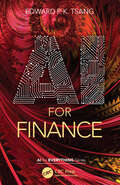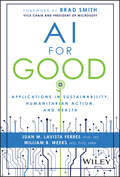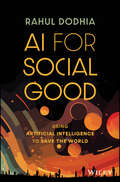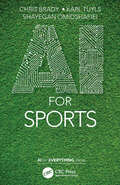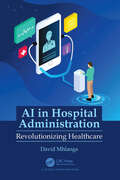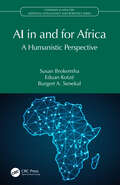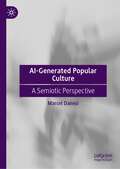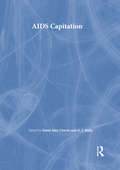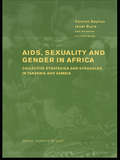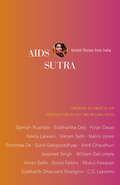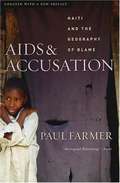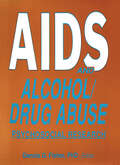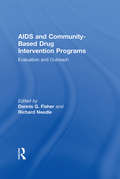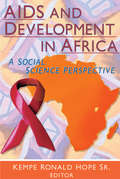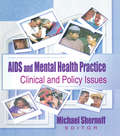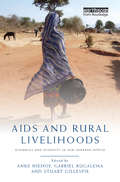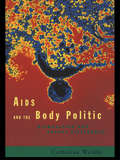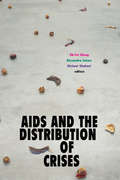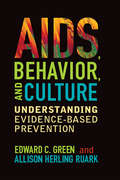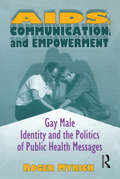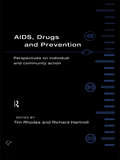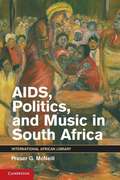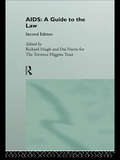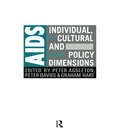- Table View
- List View
AI for Finance (AI for Everything)
by Edward P. TsangFinance students and practitioners may ask: can machines learn everything? Could AI help me? Computing students or practitioners may ask: which of my skills could contribute to finance? Where in finance should I pay attention? This book aims to answer these questions. No prior knowledge is expected in AI or finance. To finance students and practitioners, this book will explain the promise of AI, as well as its limitations. It will cover knowledge representation, modelling, simulation and machine learning, explaining the principles of how they work. To computing students and practitioners, this book will introduce the financial applications in which AI has made an impact. This includes algorithmic trading, forecasting, risk analysis portfolio optimization and other less well-known areas in finance. This book trades depth for readability. It aims to help readers to decide whether to invest more time into the subject. This book contains original research. For example, it explains the impact of ignoring computation in classical economics. It explains the relationship between computing and finance and points out potential misunderstandings between economists and computer scientists. The book also introduces Directional Change and explains how this can be used.
AI for Good: Applications in Sustainability, Humanitarian Action, and Health
by Juan M. Lavista Ferres William B. WeeksDiscover how AI leaders and researchers are using AI to transform the world for the better In AI for Good: Applications in Sustainability, Humanitarian Action, and Health, a team of veteran Microsoft AI researchers delivers an insightful and fascinating discussion of how one of the world’s most recognizable software companies is tacking intractable social problems with the power of artificial intelligence (AI). In the book, you’ll learn about how climate change, illness and disease, and challenges to fundamental human rights are all being fought using replicable methods and reusable AI code. The authors also provide: Easy-to-follow, non-technical explanations of what AI is and how it works Examinations of how healthcare is being improved, climate change is being addressed, and humanitarian aid is being facilitated around the world with AI Discussions of the future of AI in the realm of social benefit organizations and efforts An essential guide to impactful social change with artificial intelligence, AI for Good is a must-read resource for technical and non-technical professionals interested in AI’s social potential, as well as policymakers, regulators, NGO professionals, and, and non-profit volunteers.
AI for Social Good: Using Artificial Intelligence to Save the World
by Rahul DodhiaUnderstand the real power of AI and and its ability to shape the future for the better. AI For Social Good: Using Artificial Intelligence to Save the World bridges the gap between the current state of reality and the incredible potential of AI to change the world. From humanitarian and environmental concerns to advances in art and science, every area of life stands poised to make a quantum leap into the future. The problem? Too few of us really understand how AI works and how to integrate it into our policies and projects. In this book, Rahul Dodhia, Deputy Director of Microsoft’s AI for Good Research Lab, offers a nontechnical exploration of artificial intelligence tools—how they’re built, what they can and can’t do, and the raw material that teaches them what they “know.” Readers will also find an inventory of common challenges they might face when integrating AI into their work. You'll also read more on: The potential for AI to solve longstanding issues and improve lives Learn how you can tap into the power of AI, regardless of the size of your organization Gain an understanding of how AI works and how to communicate with AI scientists to create new solutions Understand the real risks of implementing AI and how to avoid potential pitfalls Real-life examples and stories that demonstrate how teams of AI specialists, project managers, and subject matter experts can achieve remarkable products. Written for anyone who is curious about AI, and especially useful for policymakers, project managers, and leaders who work alongside AI, AI For Social Good provides discussions of how AI scientists create artificially intelligent systems, and how AI can be used ethically (or unethically) to transform society. You’ll also find a discussion of how governments can become more flexible, helping regulations keep up with the fast pace of change in technology.
AI for Sports (AI for Everything)
by Chris Brady Karl Tuyls Shayegan OmidshafieiIt seems that artificial intelligence (AI) is always just five years away, but it never arrives. Recently, however, developments have made the practical utility of game theory a genuine reality. Will sport provide the petri dish in which AI will prove itself? What do domain specialists like managers and coaches want to know that they can’t currently find out, and can AI provide the answer? What competitive advantages might AI provide for recruitment, performance and tactics, health and fitness, pedagogy, broadcasting, eSports, gambling and stadium design in the future? Written by leading experts in both sports management and AI, AI for Sports begins to answer these and many other questions on the future of AI for sports.
AI in Hospital Administration: Revolutionizing Healthcare
by David MhlangaAI in Hospital Administration: Revolutionizing Healthcare is a groundbreaking book that explores the transformative potential of artificial intelligence (AI) in hospital administration and its impact on revolutionizing healthcare. This book draws on existing academic literature and interdisciplinary research to provide a comprehensive overview of cutting-edge AI technologies and their applications in hospital administration. The book begins by highlighting the basics of AI. It moves to the challenges hospital administrators face, such as long wait times, inefficient scheduling, inaccurate forecasting, and suboptimal resource allocation. It emphasizes the need for effective management and decision-making strategies to optimize patient outcomes while ensuring efficient resource utilization. While AI has seen significant advancements in areas like medical imaging and clinical decision support systems, its role in hospital administration remains relatively understudied. This book aims to fill this gap by delving into the complexities of managing patient flow, optimizing resource allocation, ensuring effective staff scheduling, and implementing data-driven decision-making processes. It explores various AI-powered solutions, including machine learning, natural language processing, and predictive analytics, and their potential to alleviate these challenges. It also covers ethical considerations and potential barriers to AI adoption in healthcare, such as privacy concerns, data security, and the human-machine interface. The book includes real-world case studies and examples of successful AI implementations in hospital administration to provide practical insights. Doing so equips healthcare professionals, administrators, policymakers, and researchers with the knowledge and tools to leverage AI effectively, foster innovation, and drive positive change in healthcare organizations. In short, AI in Hospital Administration: Revolutionizing Healthcare addresses the gap in academic literature surrounding the role of AI in hospital administration. It comprehensively understands this domain's challenges, limitations, and opportunities, stimulating further research and promoting informed decision-making. The book envisions a future where AI plays a central role in transforming healthcare administration for the better.
AI in and for Africa: A Humanistic Perspective (Chapman & Hall/CRC Artificial Intelligence and Robotics Series)
by Susan Brokensha Eduan Kotzé Burgert A. SenekalAI in and for Africa: A Humanistic Perspective explores the convoluted intersection of artificial intelligence (AI) with Africa’s unique socio-economic realities. This book is the first of its kind to provide a comprehensive overview of how AI is currently being deployed on the African continent. Given the existence of significant disparities in Africa related to gender, race, labour, and power, the book argues that the continent requires different AI solutions to its problems, ones that are not founded on technological determinism or exclusively on the adoption of Eurocentric or Western-centric worldviews. It embraces a decolonial approach to exploring and addressing issues such as AI’s diversity crisis, the absence of ethical policies around AI that are tailor-made for Africa, the ever-widening digital divide, and the ongoing practice of dismissing African knowledge systems in the contexts of AI research and education. Although the book suggests a number of humanistic strategies with the goal of ensuring that Africa does not appropriate AI in a manner that is skewed in favour of a privileged few, it does not support the notion that the continent should simply opt for a "one-size-fits-all" solution either. Rather, in light of Africa’s rich diversity, the book embraces the need for plurality within different regions’ AI ecosystems. The book advocates that Africa-inclusive AI policies incorporate a relational ethics of care which explicitly addresses how Africa’s unique landscape is entwined in an AI ecosystem. The book also works to provide actionable AI tenets that can be incorporated into policy documents that suit Africa’s needs. This book will be of great interest to researchers, students, and readers who wish to critically appraise the different facets of AI in the context of Africa, across many areas that run the gamut from education, gender studies, and linguistics to agriculture, data science, and economics. This book is of special appeal to scholars in disciplines including anthropology, computer science, philosophy, and sociology, to name a few.
AI-Generated Popular Culture: A Semiotic Perspective
by Marcel DanesiThis book gives a general overview of Artificial Intelligence as it is impacting on the world of the arts and culture. What is AI-generated pop culture? What does a movie, a musical work, a novel, or song created entirely by a generative AI imply in terms of our notions of creativity? What is the semiotic dynamic (the meaning-making impulse that humans imprint in sign and textual forms) that is involved in an AI-produced work? No comprehensive treatment exists of the profound implications that AI-generated pop culture entails, including how it might affect cultural evolution and how we interpret artistic artifacts. Such a treatment is critical at this moment, and this book aims to fill this gap.
AIDS Capitation
by David A CherinDiscover effective strategies for AIDS healthcare!You’ll definitely want to see what’s documented inside AIDS Capitation if you’re affiliated in any way with current efforts to bolster and improve healthcare policies and procedures for AIDS victims and their families. With this scholarly, up-to-date guidebook, you’ll find that your awareness and knowledge base concerning contemporary AIDS healthcare issues will expand and diversify, giving you a more stable information base from which you can make your own policy changes and civic organization improvements.If you’re a practitioner in HIV/AIDS care, an academic in HIV/AIDS research, or one of the many public officials currently involved in healthcare reform, you’ll find the guidance and proven strategies you need in AIDS Capitation. AIDS Capitation gives you a broad range of information including: descriptive and evaluative aspects of the model of care directions for implementing an innovative model of terminal home care modalities of care in end-stage treatment measurement issues in evaluative research help in measuring outcomes in community-based care funding opportunitiesWithout a doubt, the onset of HIV/AIDS has changed the way we view life. Our schools, government offices, and healthcare venues must change also. AIDS Capitation has everything you need to begin that process of change in your community.
AIDS Sexuality and Gender in Africa: Collective Strategies and Struggles in Tanzania and Zambia (Social Aspects of AIDS)
by Janet Bujra Carolyn BayliesWhile there is a growing list of publications devoted to the AIDS epidemic, Africa, with two-thirds of the world's cases, still receives scant attention. This book may change the way we think about AIDS and how it is being addressed in Africa and the rest of the world.The book draws on first-hand research and in-depth investigations carried out by a team of researchers from Britain, Zambia and Tanzania, and focuses on the gendered aspect of the struggle against AIDS.The authors study the severity of the epidemic and the threat it poses to the population and society in Tanzania and Zambia. They argue that the success of strategies against the spread of AIDS in Africa rests on their recognition of existing gendered power relations and that this success might be enhanced if the strategies are built on existing organisational skills and practices, especially among women. Their conclusions have repercussions for all countries around the world, and especially the rest of Africa.
AIDS Sutra
by Amartya SenIn this groundbreaking anthology, sixteen renowned writers tell the hidden story of the AIDS crisis, illuminating the complex nature of one of the major problems facing the developing world. India is home to almost 3 million HIV cases, but AIDS is still stigmatized and shrouded in denial. Discrimination against HIV-affected individuals in hospitals, schools, and even among families is common, just as discussion about HIV and participation in prevention or treatment programs are not. In this riveting book, sixteen of India's most well-known writers go on the road to uncover the reality of AIDS in India and tell the human stories behind the epidemic.Kiran Desai travels to the coast of Andhra Pradesh, where the sex workers are considered the most desirable; Salman Rushdie meets members of Mumbai's transgender community; William Dalrymple encounters the devadasis, women who have been "married" to a temple goddess and thus are deemed acceptable for transactional sex. Eye-opening, hard-hitting, and moving, AIDS Sutra presents a side of India rarely seen before.From the Trade Paperback edition.
AIDS and Accusation: Haiti and the Geography of Blame
by Paul FarmerExposes the racism inherent in the now-discredited supposition that AIDS came to the US via Haiti. (It was the other way around.) Award-winning author Paul Farmer, now working in Rwanda, updates this 1992 study with a new preface.
AIDS and Alcohol/Drug Abuse: Psychosocial Research
by Dennis FisherAIDS is the number one health issue facing the nation today. The way in which AIDS relates to substance abuse is explored by drug abuse researchers in this timely volume. A major focus of AIDS and Alcohol/Drug Abuse is on the problems of conducting AIDS research on racial minorities in this country. Bringing together experts in the field, this volume examines the specific obstacles and challenges researchers have faced in assessing and addressing the needs of underserved populations and maps routes and procedures that can improve both research and available health care services.This unique volume also focuses on aspects of HIV infection that have received little attention elsewhere. It includes the first information published in the open literature about intravenous drug use in Alaska. Another chapter highlights some little-known facts that relate substance abuse to HIV infection in the American Indian/Alaskan Native population, among whom--it has been predicted--a devastating epidemic of HIV infection is likely. Problems with prevention, research, and treatment of individuals who are both intravenous drug users and who are infected with HIV are explored. Other chapters look at the transmission of HIV infection--by gay men who are alcoholics and by intravenous drug users. AIDS and Alcohol/Drug Abuse ends with hopeful chapter for AIDS prevention. Readers interested in the relationship of intravenous drug use and HIV infection, particularly among racial and ethnic minorities, will find this to be a practical, readable book. In particular, substance abuse counselors and researchers, and anyone involved in the AIDS prevention movement will find a valuable wealth of information.
AIDS and Community-Based Drug Intervention Programs: Evaluation and Outreach
by Dennis Fisher Richard NeedleDelve into the uncharted territory of the “hidden” drug addict--users who are not in treatment, not incarcerated, and not officially accessible for research purposes through traditional means. AIDS and Community-Based Drug Intervention Programs describes short-term interventions used to reduce the odds that these drug users will get infected by the Human Immunodeficiency Virus (HIV). The book explains new methods that are being developed, such as targeted sampling, social network analysis, geomapping, and other amalgams of both quantitative and qualitative approaches, that need to be forged to overcome the challenges of the war against AIDS. The research described in this important book was conducted under the Cooperative Agreement for AIDS Community-Based Outreach/Intervention Research funding mechanism of the National Institute on Drug Abuse (NIDA). Chapters include research on several ethnic groups, including Alaska natives, Puerto Ricans, and Navaho teens. AIDS and Community-Based Drug Treatment Programs, written by experts in the field, is a broad-based treatment of the subject by those who are actually doing the work in the trenches. Authors cover topics such as: the use of goal-oriented counseling and peer support to reduce HIV/AIDS risk quantitative and qualitative methods to assess behavioral change among injection drug users (IDUs) the importance of sampling from hidden populations in research a public health model for reducing AIDS-related risk behavior among IDUs and their sexual partners characteristics of female sexual partners of IDUs strategies used to implement random sampling strategies in the recruitment of out-of-treatment crack and IDUs ethnographic analysis of intravenous drug use analysis of contact tracing strategies employed to combat the AIDS epidemic the use of pile sorts to enhance other tools used by drug prevention programsAIDS and Community-Based Drug Intervention Programs is full of current research and useful information for professionals interested in learning about strategies for conducting HIV/AIDS research among hard-to-reach populations. Substance abuse researchers, treatment professionals, and people involved in AIDS prevention programs, state and county health departments, and criminal justice systems will find much relevant and important information to use in their daily work.
AIDS and Development in Africa: A Social Science Perspective (Haworth Psychosocial Issues Of Hiv/aids Ser.)
by R Dennis Shelby Kempe Ronald Hope, SrAIDS and Development in Africa: A Social Science Perspective is the first book-length treatment of both the impact of AIDS in Africa and an assessment of intervention strategies in varying cultural situations. Developed from revised selected papers from the nineteenth Southern African Universities Social Science Conference, AIDS and Development in Africa will be of interest to counselors, medical and development practitioners, Africanists, and AIDS researchers. From this book, you will find wide analytical coverage of the issues and country case studies related to the contributory factors and development impact of the HIV/AIDS pandemic in Africa. You will also explore the ability of countries to willingly promote and cope with the pandemic in the context of their different economic circumstances.Specifically in AIDS and Development in Africa, you will read about: socioeconomic context of AIDS social scientific explanations of the AIDS pandemic in Africa HIV/AIDS and the status of women in Botswana and Swaziland sexual abuse and HIV/AIDS law and HIV/AIDS orphans of the AIDS pandemic media and the African context of social construction human resource development and training in relation to HIV/AIDS in ZambiaAIDS and Development in Africa uses a multidisciplinary social science perspective in case studies of such countries as Botswana, Swaziland, Zimbabwe, South Africa, Malawi, and Zambia to reveal contributory factors and the developmental impact of HIV/AIDS in Africa. This book demonstrates the human consequences of AIDS and the efforts being made by governments, individuals, families, villages, communities, and national government organizations to respond to the pandemic. For example, you will learn about information campaigns and peer education approaches that are successfully increasing transmission awareness and condom use. You will read beyond the usual analysis of demographics and receive much more substantial assessments and analyses of the burden on people, economies, and health care systems of the African countries. AIDS and Development in Africa is indispensable to anyone who is involved with HIV/AIDS prevention/intervention in Africa. This comprehensive book provides you with essential and up-to-date research on the many issues surrounding Africa’s HIV/AIDS pandemic.
AIDS and Masculinity in the African City: Privilege, Inequality, and Modern Manhood
by Robert WyrodAIDS has been a devastating plague in much of sub-Saharan Africa, yet the long-term implications for gender and sexuality are just emerging. AIDS and Masculinity in the African City tackles this issue head on and examines how AIDS has altered the ways masculinity is lived in Uganda--a country known as Africa's great AIDS success story. Based on a decade of ethnographic research in an urban slum community in the capital Kampala, this book reveals the persistence of masculine privilege in the age of AIDS and the implications such privilege has for combating AIDS across the African continent.
AIDS and Mental Health Practice: Clinical and Policy Issues
by Michael Shernoff R Dennis ShelbyAddressing contemporary issues faced by individuals with HIV/AIDS, AIDS and Mental Health Practice: Clinical and Policy Issues provides psychologists, psychiatrists, social workers, and counselors with research and case studies that offers models for effective clinical practice at this stage of the epidemic. Each chapter is written by experts in the field and demonstrates ways to provide better services to different populations, many of whom are ignored in AIDS and mental health literature. As a result, this book will provide professionals in the field and students in training with the most current practice information about mental health practice and HIV/AIDS. AIDS and Mental Health Practice will help you understand the diverse needs of people with HIV/AIDS and organize services to assist these populations. AIDS and Mental Health Practice discusses issues that affect several different groups in order to help you understand the unique situations of your clients. You will learn how to design treatments that will be most beneficial to Latinos, intravenous drug users, orphaned children, African Americans, HIV-negative gay men, HIV nonprogressors, HIV-positive transsexuals, end-stage AIDS clients, couples of mixed HIV status, and individuals suffering from HIV-associated Cognitive Motor Disorder. This book provides you with approaches that will improve services for these populations, including: talking to patients about the positive and negative aspects of taking protease inhibitors and discussing their feelings of hope, skepticism, and fear of being disappointed by the treatment preparing clients to go back to work by exploring the meaning of work and referring them to vocational services if necessary providing support groups for people living with AIDS (PLWAs), their loved ones, their families, and individuals in bereavement as a result of an AIDS-related death organizing a HIV-negative gay men’s support group that uses exercises and homework to focus on the members’ambivalent connection to the AIDS community, how they remain HIV negative, and ways to deal with separation and grief issues assessing and/or correcting underlying racism in AIDS service organizationsThe prevention and intervention strategies in Mental Health and AIDS Practice will help you address and treat mental health issues associated with HIV/AIDS and offer clients more effective and relevant services.
AIDS and Rural Livelihoods: Dynamics and Diversity in sub-Saharan Africa
by Anke Niehof Gabriel RugalemaAIDS epidemics continue to threaten the livelihoods of millions of people in sub-Saharan Africa. Three decades after the disease was first recognized, the annual death toll from AIDS exceeds that from wars, famine and floods combined. Yet despite millions of dollars of aid and research, there has previously been little detailed on-the-ground analysis of the multifaceted impacts on rural people. Filling that gap, this book brings together recent evidence of AIDS impacts on rural households, livelihoods, and agricultural practice in sub-Saharan Africa. There is particular emphasis on the role of women in affected households, and on the situation of children. The book is unique in presenting micro-level information collected by original empirical research in a range of African countries, and showing how well-grounded conclusions on trends, impacts and local responses can be applied to the design of HIV-responsive policies and programmes. AIDS impacts are more diverse than we previously thought, and local responses more varied - sometimes innovative, sometimes desperate. The book represents a major contribution to our understanding of the impacts of AIDS in the epidemic's heartland, and how these can be managed at different levels.
AIDS and the Body Politic: Biomedicine and Sexual Difference (Corporealities Ser.)
by Catherine WaldbyFirst published in 2004. Routledge is an imprint of Taylor & Francis, an informa company.
AIDS and the Distribution of Crises
by Alexandra Juhasz Jih-Fei Cheng Nishant ShahaniAIDS and the Distribution of Crises engages with the AIDS pandemic as a network of varied historical, overlapping, and ongoing crises born of global capitalism and colonial, racialized, gendered, and sexual violence. Drawing on their investments in activism, media, anticolonialism, feminism, and queer and trans of color critiques, the scholars, activists, and artists in this volume outline how the neoliberal logic of “crisis” structures how AIDS is aesthetically, institutionally, and politically reproduced and experienced. Among other topics, the authors examine the writing of the history of AIDS; settler colonial narratives and laws impacting risk in Indigenous communities; the early internet regulation of both content and online AIDS activism; the Black gendered and sexual politics of pleasure, desire, and (in)visibility; and how persistent attention to white men has shaped AIDS as intrinsic to multiple, unremarkable crises among people of color and in the Global South.Contributors. Cecilia Aldarondo, Pablo Alvarez, Marlon M. Bailey, Emily Bass, Darius Bost, Ian Bradley-Perrin, Jih-Fei Cheng, Bishnupriya Ghosh, Roger Hallas, Pato Hebert, Jim Hubbard, Andrew J. Jolivette, Julia S. Jordan-Zachery, Alexandra Juhasz, Dredge Byung'chu Kang-Nguyễn, Theodore (Ted) Kerr, Catherine Yuk-ping Lo, Cait McKinney, Viviane Namaste, Elton Naswood, Cindy Patton, Margaret Rhee, Juana María Rodríguez, Sarah Schulman, Nishant Shahani, C. Riley Snorton, Eric A. Stanley, Jessica Whitbread, Quito Ziegler
AIDS, Behavior, and Culture: Understanding Evidence-Based Prevention (Key Questions in Anthropology)
by Edward C Green Allison Herling RuarkAIDS, Behavior, and Culture presents a bold challenge to the prevailing wisdom of “the global AIDS industry” and offers an alternative framework for understanding what works in HIV prevention. Arguing for a behavior-based approach, Green and Ruark make the case that the most effective programs are those that encourage fundamental behavioral changes such as abstinence, delay of sex, faithfulness, and cessation of injection drug use. Successful programs are locally based, low cost, low tech, innovative, and built on existing cultural structures. In contrast, they argue that anthropologists and public health practitioners focus on counseling, testing, condoms, and treatment, and impose their Western values, culture, and political ideologies in an attempt to “liberate” non-Western people from sexual repression and homophobia. This provocative book is essential reading for anyone working in HIV/AIDS prevention, and a stimulating introduction to the key controversies and approaches in global health and medical anthropology for students and general readers.
AIDS, Communication, and Empowerment: Gay Male Identity and the Politics of Public Health Messages
by Roger MyrickAIDS, Communication, and Empowerment examines the cultural construction of gay men in light of discourse used in the media’s messages about HIV/AIDS--messages often represented as educational, scientific, and informational but which are, in fact, politically charged. The book offers a compelling and substantive look at the social consequences of communication about HIV/AIDS and the reasons for the successes and failures of contemporary health communication. This analysis is important because it provides a reading of health communication from a marginal perspective, one that has often been kept silent in mainstream academic research. AIDS, Communication, and Empowerment offers a critical, historical analysis of public health communication about HIV/AIDS; the ways this communication makes sense historically and culturally; and the implications such messages have for the marginal group which has been most stigmatized as a consequence of these messages. It covers such topics as: the relationship among gay identity, language, and power cultural studies of the historical development of gay identity studies in health communication about HIV/AIDS and health risk communication the political consequences of public health education about HIV/AIDS on gay men the political consequences of media representations of gay identity and its relationship to disease Based primarily on the French scholar Michel Foucault’s critical, historical analysis of discourse and sexuality, this book takes a timely and original approach which differs from traditional, quantitative communication studies. It examines the relationship between language and culture using a qualitative, cultural studies approach which places medicalization theories in the broader context of histories of sexuality, the discursive development of contemporary gay identity, and recent public health communication.Author Roger Myrick explains how mainstream communication about HIV/AIDS relentlessly stigmatizes and further marginalizes gay identity. He describes how national health education stigmatizes groups by associating them with images of disease and “otherness.” Even communication which originates from marginal groups, particularly those relying on federal funds, often participates in linking gay identities with disease. According to Myrick, government funding, while often necessary for the continuation of community-based health campaigns, poses obvious and direct restrictions on effective marginal education. AIDS, Communication, and Empowerment allows for a rethinking of ways marginal groups can take control of their own education on public health issues. As HIV/AIDS cases continue to rise dramatically among marginalized and disenfranchised groups, analysis of health communication directed toward them becomes crucial to their survival. This book provides valuable insights and information for scholars, professionals, readers interested in the relationship among language, power and marginal identity, and for classes in gay and lesbian studies, health communication, or political communication.
AIDS, Drugs and Prevention: Perspectives On Individual And Community Action
by Tim Rhodes Richard HartnollAIDS, Drugs and Prevention brings together a range of international contributions on the research, theory and practice of developing community-based HIV prevention. It aims to understand how individual actions to prevent HIV transmission are constrained and encouraged by situational and social context. Drawing on ethnographic and epidemiological research among populations of drug users, sex workers and gay men, it explores how future HIV prevention interventions can target changes at the level of the individual as well as at the level of the community and wider social environment. AIDS, Drugs and Prevention offers practical and theoretical insights into community-based health work in the time of AIDS. It provides invaluable reading for students, lecturers, researchers and practioners in health promotion, health policy, social work and medical sociology.
AIDS, Politics, and Music in South Africa
by Fraser G. McneillThis book offers an original anthropological approach to the AIDS epidemic in South Africa, demonstrating why AIDS interventions in the former homeland of Venda have failed - and possibly even been counterproductive. It does so through a series of ethnographic encounters, from kings to condoms, which expose the ways in which biomedical understanding of the virus have been rejected by - and incorporated into - local understandings of health, illness, sex and death. Through the songs of female initiation, AIDS education and wandering minstrels, the book argues that music is central to understanding how AIDS interventions operate. This book elucidates a hidden world of meaning in which people sing about what they cannot talk about, where educators are blamed for spreading the virus, and in which condoms are often thought to cause AIDS. The policy implications are clear: African worldviews must be taken seriously if AIDS interventions in Africa are to become successful.
AIDS: A Guide To The Law
by Richard Haigh Dai HarrisFirst published in 1995. Routledge is an imprint of Taylor & Francis, an informa company.
AIDS: Individual, Cultural And Policy Dimensions (Social Aspects of AIDS)
by Peter Davies Peter Aggleton Graham HartFirst Published in 1990. Routledge is an imprint of Taylor & Francis, an informa company.
